Cough Lower Abdomen Pain: Understanding The Causes, Symptoms, And Effective Treatments
Experiencing cough lower abdomen pain can be distressing and may indicate an underlying health issue. Whether it's caused by respiratory conditions, gastrointestinal problems, or other factors, understanding the symptoms and seeking proper treatment is crucial for your well-being. In this comprehensive guide, we will delve into the causes, symptoms, and treatment options for this condition to help you make informed decisions about your health.
Many individuals experience discomfort in the lower abdomen when they cough, which can range from mild to severe. This symptom often raises concerns about potential underlying conditions. By exploring the various factors that contribute to cough lower abdomen pain, we aim to provide clarity and actionable advice to manage this condition effectively.
Our goal is to equip you with the necessary knowledge to recognize the signs, understand the causes, and take appropriate steps to address cough-related lower abdomen pain. Let's begin by examining the most common causes of this condition and how it affects your daily life.
Read also:Rose Mcgowan Pictures A Comprehensive Look At Her Iconic Style And Influence
Table of Contents
- Biography (If Applicable)
- Understanding the Causes of Cough Lower Abdomen Pain
- Recognizing the Symptoms
- How to Diagnose the Condition
- Effective Treatment Options
- Lifestyle Changes to Manage Symptoms
- Preventive Measures
- Potential Complications
- Expert Advice on Managing Symptoms
- Conclusion and Call to Action
Understanding the Causes of Cough Lower Abdomen Pain
Cough lower abdomen pain can stem from a variety of medical conditions, and identifying the root cause is essential for effective treatment. Below are some of the most common causes:
Respiratory Infections
Respiratory infections such as bronchitis or pneumonia can lead to persistent coughing, which may strain the abdominal muscles and cause pain in the lower abdomen. These infections often involve inflammation of the airways, leading to discomfort during coughing episodes.
Gastrointestinal Issues
Gastrointestinal problems like acid reflux, irritable bowel syndrome (IBS), or diverticulitis can also contribute to cough lower abdomen pain. The connection between respiratory and digestive systems means that a persistent cough can exacerbate gastrointestinal discomfort.
- Acid reflux: Occurs when stomach acid flows back into the esophagus, causing irritation and triggering a chronic cough.
- IBS: Can cause abdominal cramping and discomfort, which may worsen with prolonged coughing.
- Diverticulitis: Inflammation of small pouches in the colon, often leading to localized pain in the lower abdomen.
Recognizing the Symptoms
Identifying the symptoms associated with cough lower abdomen pain is crucial for early diagnosis and treatment. Here are some common symptoms:
Primary Symptoms
- Persistent cough
- Sharp or dull pain in the lower abdomen
- Increased pain during coughing episodes
Secondary Symptoms
- Fatigue
- Loss of appetite
- Nausea or vomiting
It is important to consult a healthcare professional if these symptoms persist or worsen over time.
How to Diagnose the Condition
Diagnosing the underlying cause of cough lower abdomen pain involves a thorough evaluation by a healthcare provider. The following diagnostic methods are commonly used:
Read also:Unraveling The Mystery The Black Dahlia Crime Scene And Its Enduring Legacy
Physical Examination
A physical examination allows the doctor to assess the abdomen for tenderness, swelling, or other abnormalities that may indicate the source of the pain.
Imaging Tests
Imaging tests such as X-rays, ultrasounds, or CT scans can help identify structural issues or inflammation in the abdominal area.
Laboratory Tests
Blood tests, urine analysis, and stool samples may be required to detect infections, inflammation, or other abnormalities that could be contributing to the symptoms.
Effective Treatment Options
Treatment for cough lower abdomen pain depends on the underlying cause. Below are some common treatment approaches:
Medications
- Antibiotics for bacterial infections
- Antacids or proton pump inhibitors for acid reflux
- Pain relievers for managing discomfort
Therapies
Physical therapy or breathing exercises may be recommended to strengthen abdominal muscles and reduce strain during coughing episodes.
Lifestyle Changes to Manage Symptoms
Making certain lifestyle adjustments can help alleviate cough lower abdomen pain. Consider the following tips:
Dietary Modifications
Adopting a balanced diet rich in fiber and avoiding trigger foods can reduce gastrointestinal symptoms that contribute to abdominal pain.
Hydration
Staying well-hydrated helps maintain optimal digestive and respiratory health, reducing the likelihood of complications.
Preventive Measures
Taking preventive steps can minimize the risk of developing cough lower abdomen pain. Some strategies include:
Regular Exercise
Engaging in regular physical activity strengthens the core muscles, reducing the strain on the abdomen during coughing.
Proper Hygiene
Practicing good hygiene, such as frequent handwashing, can prevent respiratory infections that lead to persistent coughing.
Potential Complications
If left untreated, cough lower abdomen pain can lead to more severe complications. Some possible complications include:
Hernias
Prolonged coughing can weaken the abdominal wall, increasing the risk of developing a hernia.
Chronic Pain
Without proper management, the pain may become chronic, significantly impacting quality of life.
Expert Advice on Managing Symptoms
Healthcare professionals emphasize the importance of early intervention and personalized treatment plans for managing cough lower abdomen pain. Consulting with a specialist, such as a pulmonologist or gastroenterologist, can provide tailored solutions based on individual needs.
Conclusion and Call to Action
In conclusion, cough lower abdomen pain is a complex condition with multiple potential causes. By understanding the symptoms, seeking timely diagnosis, and following appropriate treatment plans, individuals can effectively manage this condition and improve their overall well-being.
We encourage you to share your experiences or ask questions in the comments section below. Additionally, explore other articles on our website for more insights into maintaining a healthy lifestyle. Together, let's take proactive steps toward better health!
For further reading, consider consulting reputable sources such as the Mayo Clinic or the National Institutes of Health for additional information on managing cough lower abdomen pain.


